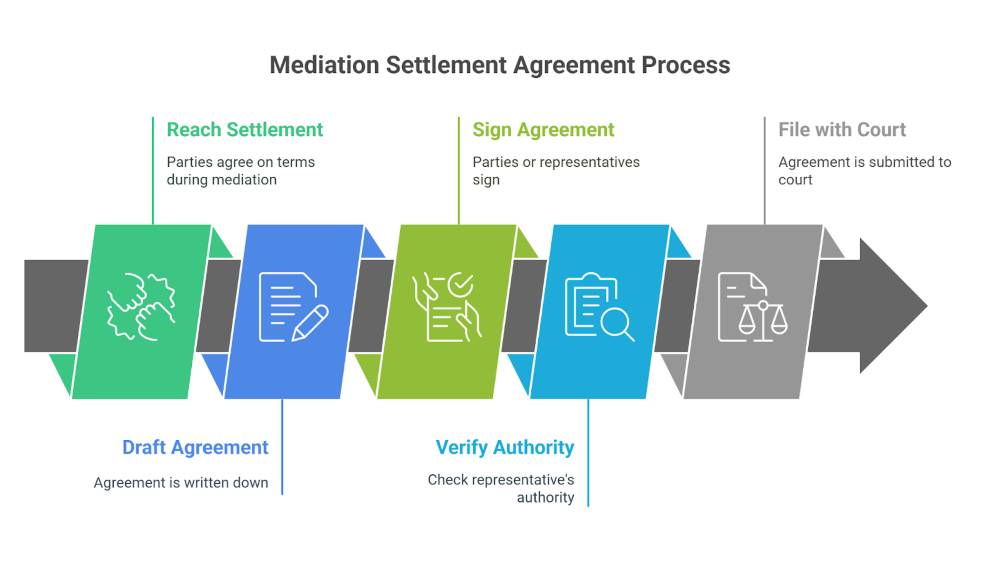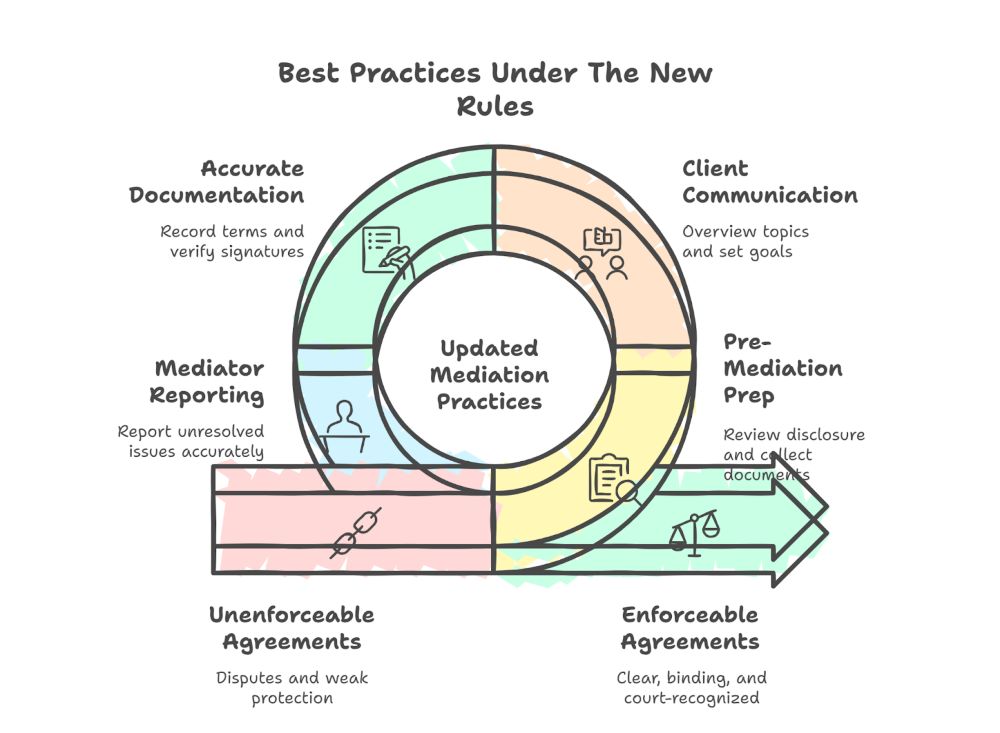

Florida rolled out some big changes to its mediation settlement agreement rules for 2025. These updates alter how attorneys must handle agreements in practice.
Attorneys should be aware that, as of January 1, 2023, all mediation settlement agreements in Florida must be in writing and signed by every party and their respective attorneys to be considered enforceable.
These rule changes impact what happens after a resolution, how courts review agreements, and the steps required to ensure everything is upheld. It’s a lot to take in, but it’s crucial for anyone working in mediation this year.
Knowing the new procedures is vital for any attorney involved in mediation. If you don’t follow the requirements, your agreement could fall apart, leading to delays or worse.
Legal professionals must review the updated mediation rules and adjust their practices to remain compliant in 2025 and beyond. It’s not optional if you want your settlements enforced.
Table of Contents
Key Takeaways
- Florida mediation settlement agreements must be written and signed by all parties and attorneys.
- The new rules require careful compliance to ensure enforceability.
- Legal practitioners should update their processes for 2025 mediation cases to ensure compliance.
Overview Of The 2025 Mediation Rule Changes

The Florida 2025 mediation rules bring new procedures that affect how attorneys handle mediation cases and settlement agreements.
The updates include changes to disclosure requirements, stricter reporting guidelines, and new standards for case management.
Introduction To The 2025 Amendments
In 2025, Florida courts approved amendments aimed at streamlining mediation and making settlement agreements clearer and more enforceable. One notable change is the addition of detailed rules for the Report of Mediation, which standardizes the recording of outcomes.
Now, if mediation is paused for further negotiation, the parties must report any adjournments.
Financial disclosures are more tightly regulated, especially in family law, making it harder for anyone to hide assets or fudge numbers.
These changes are supposed to make things fairer and more transparent. The rules also clarify when a mediation settlement agreement in Florida becomes legally binding, thereby reducing the likelihood of post-mediation disputes.
Key Objectives Of The Amendments
The 2025 updates aim to boost efficiency and trust in Florida’s mediation system. The main goals focus on three areas:
- Transparency: Clear financial disclosures and formalized mediation reports keep everyone better informed.
- Consistency: Standardized documentation enables judges and attorneys to track cases and enforce settlements with clarity and precision, ensuring a consistent approach.
- Reduced Litigation: With clearer settlements and fewer loose ends, courts see fewer post-mediation battles.
Attorneys should pay attention to the new emphasis on prompt and complete reporting.
The updated requirements for case reporting and adjournment necessitate that lawyers closely track deadlines and complete paperwork on time.
Detailed Breakdown Of Rule 1.730 Amendments

The 2025 amendments to Rule 1.730 shake up how mediation settlement agreements get finished in Florida.
They established new signature rules and clarified who can sign on behalf of parties, which is important for both lawyers and clients.
Signature Requirements Simplified
The new Rule 1.730 simplifies the signature requirements. If you settle during court-ordered mediation, the agreement must be written and signed by the parties or their authorized representatives immediately.
This change removes unnecessary delays and confusion. Now, agreements can be signed by the parties themselves or by anyone they’ve legally chosen to represent them, as long as that person has settlement authority.
Electronic signatures are fine, which makes things move faster. This approach should help reduce disputes over whether an agreement is legitimate.
Agreements still need to be clear and in writing. Sometimes, you’ll need to file a deal or a report with the court.
Authority Of Representatives
The amendments guide on using authorized representatives. A representative can sign if the party they represent grants them full authority to settle, but that authority must be specific and in writing.
Attorneys should ensure that their clients provide written consent and proper settlement authority to any representatives before mediation. Without this, a representative’s signature may not be valid.
Clear rules on who qualifies as an authorised representative help avoid confusion and legal headaches later.
Need commercial mediation services that align with Florida’s 2025 compliance standards? The Mediation Group helps businesses reach enforceable agreements efficiently and effectively. Contact us to schedule your next mediation.
If you’re ready to get started, call us now!
Implications For Legal Practitioners
These changes to Florida’s mediation settlement agreement rules affect how attorneys draft, finalize, and file agreements. Practitioners need to know what’s required for enforceability—and what happens if they miss a step.
Ensuring Enforceability
Florida now says a mediation settlement agreement has to be in writing and signed by all parties to be enforceable in court. If it meets these criteria, courts will enforce it.
Attorneys should review the language in the document to ensure that everyone signs.
Recent amendments have dropped the requirement for counsel signatures, so now only the parties themselves are required to sign under the updated rules.
Lawyers should explain to clients that unsigned agreements aren’t valid or binding. For more on these changes, see enforceable mediation agreements in Florida.
- Use straightforward language.
- Double-check all required signatures.
- Make sure terms aren’t ambiguous.
Risk Of Non-Compliance
If you don’t follow the new rules, you risk serious consequences. Courts can refuse to enforce agreements that don’t meet the requirements, which could result in delays or even the loss of the settlement altogether.
If someone breaches a valid agreement, the court may order penalties such as attorney fees, costs, or other remedies.
Attorneys must ensure that both they and their clients understand the risks of not complying with mediation rules.
Here are some example risks:
| Non-Compliance Issue | Potential Consequence |
| Missing signatures | Agreement not enforceable |
| Vague terms | Disputes and possible litigation |
| Failure to file when required | Delay or inability to enforce |
Best Practices Under The New Rules

Attorneys need to adjust their approach to handling mediation settlement agreements under Florida’s new 2025 rules.
Careful prep, solid documentation, and accurate reporting are now more important than ever to get enforceable results for clients.
Pre-Mediation Preparations
Practitioners should review the updated disclosure requirements and collect all financial documentation before mediation starts.
Florida now enforces strict financial transparency, so attorneys should make sure client assets, debts, and income statements are accurate and current.
This reduces the risk of missing something that could delay or undermine an agreement. A best practice checklist includes:
- Confirming that required disclosures are exchanged in advance
- Giving clients an overview of likely mediation topics
- Setting clear settlement goals based on current case law
Attorneys should remind clients that a properly executed mediation agreement is binding.
Skipping these steps in 2025 could mean headaches and weaker legal protection.
Documentation And Reporting
Any settlement agreement reached must be written and signed by all parties to be enforceable.
The document also requires the signature of each party’s lawyer, if they’re present, as per Florida Rule 1.730(b).
If you skip a step, the agreement won’t be binding. Key documentation tips include:
- Prepare standard agreement templates in advance
- Immediately record all terms discussed during mediation
- Double-check signatures for every participant
The mediator must report if the parties fail to reach an agreement on any issue. Attorneys should review all paperwork thoroughly before mediation concludes to catch any mistakes.
A clear and accurate final agreement helps limit disputes and ensures the court will recognise the settlement.
If you’re ready to get started, call us now!
Broader Impact On Mediation Practices In Florida
The 2025 updates to Florida’s mediation settlement rules introduce significant changes in how attorneys approach mediation and finalize agreements. These changes aim to streamline the process and hold everyone to higher standards.
Enhanced Efficiency
The new rules reshape the mediation process by setting clearer requirements for how parties prepare and submit mediation settlement agreements to the court.
The amendments to Rule 1.730 now let attorneys and clients use more flexible options for signatures and document submission.
This saves time for everyone involved. It just feels like a relief, honestly.
Electronic and virtual mediation tools are gaining popularity rapidly. Recent guidance encourages the use of technology to help reduce scheduling delays.
This shift means less travel and fewer headaches trying to coordinate in-person meetings. That’s a significant advantage for complex cases when individuals are dispersed across different locations.
Lawyers now deal with fewer signature hurdles. For example, the rule change eliminates the requirement for counsel to sign, which previously slowed down submissions and the finalization of agreements.
Mediation participants can expect swifter resolutions. Courts also face less administrative backlog under the updated Florida mediation court submission rules.
Increased Accountability
Florida has stepped up oversight of mediator conduct and settlement procedures. The updated rules now push mediators to complete more training and certification, which reinforces ethical standards across the field.
Documentation and record-keeping requirements have gotten stricter. Mediators need to provide clear, dated records of every agreement to the court.
This change reduces confusion about what people agreed to. It also helps prevent arguments over the final terms later on.
The revised mediation rules aim to identify and address improper negotiation tactics early. That way, everyone gets a fairer shot at a quality process.
Attorneys now have to take more responsibility for guiding clients through these new procedures. They need to ensure that all paperwork conforms to the court’s specific formatting and submission standards.
These efforts should make mediation outcomes clearer and more difficult to challenge down the road, as seen in Florida’s evolving mediation settlement procedure best practices.
Navigating the updated 2025 mediation rules? The Mediation Group offers family mediation services tailored to the evolving court procedures in South Florida. Schedule your session or contact us today.
Contact Us Today For An Appointment
Frequently Asked Questions
What is Florida Rule 1.730, and why was it amended in 2025?
Rule 1.730 governs the documentation and enforcement of mediation settlement agreements. The 2025 amendment was introduced to streamline execution, allow representative signatories with full authority, and clarify enforceability, especially in commercial, insurance, and family law contexts.
Does an attorney still need to sign the mediation settlement agreement?
No. As of 2025, attorney signatures are no longer required under the revised Rule 1.730. Only the parties (or their authorized representatives with full settlement authority) must sign the written agreement for it to be enforceable.
Can an insurance adjuster sign a mediation settlement agreement on behalf of a party?
Yes, provided they have full authority to settle the case. This is now clearly supported under the updated rules, which aim to eliminate ambiguity in insurer-led disputes.
What happens if the proper party or representative doesn’t sign the agreement?
The agreement may not be enforceable in court. Recent case law in Florida has shown that unsigned or improperly executed mediation agreements can be invalidated, even if the terms were agreed upon during the session.
Are electronic signatures accepted under the new Florida mediation rules?
Yes. The amended rule explicitly allows the use of electronic signatures and execution in counterparts, streamlining remote and hybrid mediations.
Do these rule changes apply to all types of mediation cases in Florida?
Yes, the amendments to Rule 1.730 apply to all court-ordered mediations conducted under the Florida Rules of Civil Procedure, including civil, commercial, insurance, and family law matters.
Should attorneys update their mediation templates and procedures?
Absolutely. All legal practitioners are advised to review and update their standard mediation forms, intake procedures, and documentation protocols to align with the 2025 requirements and avoid potential disputes over enforceability.